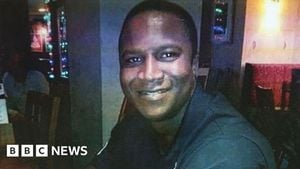On a chilly Tuesday morning in Paris, history unfolded as former French president Nicolas Sarkozy entered La Santé prison to serve a five-year sentence for criminal conspiracy. The conviction, linked to a scheme to finance his 2007 presidential campaign with funds from the late Libyan dictator Muammar Gaddafi, has made Sarkozy the first former head of state in modern France—and indeed the first postwar leader of a major EU country—to be incarcerated.
Sarkozy, now 70, left his Paris home hand-in-hand with his wife, Carla Bruni-Sarkozy, the supermodel-turned-singer, in a moment that was as somber as it was defiant. Supporters, family, and media lined the street, some waving French flags and framed photos, others singing the national anthem. The former president paused to embrace his wife before being driven away by police, a scene described by AFP as both poignant and stage-managed. His children, led by his 14-year-old daughter Giulia, joined the send-off, and his son Louis, who is preparing a mayoral run, had called for public demonstrations of support.
As Sarkozy passed through the gates of La Santé, convicts reportedly shouted from their cells, “Sarkozy’s here!” and “Welcome Sarkozy!” according to AFP reporters on the scene. Outside, the crowd chanted, “Nicolas, Nicolas! Free Nicolas!” and displayed banners reading “Courage Nicolas, return soon” and “True France with Nicolas.” Parisian resident Virginie Rochon told AP, “It’s scandalous to see a former president being taken away while still presumed innocent.” Another supporter, Véronique Maurey, remarked, “It’s just not possible. And on top of that, calling it a ‘criminal conspiracy’ kind of makes all of us feel like criminals too because we voted for him. It’s not right to say that.”
Inside the prison, Sarkozy faces solitary confinement for security reasons, a measure confirmed by his lawyer Christophe Ingrain. He will spend most of his time alone in a nine-square-meter cell equipped with a toilet, shower, desk, and a small television. He is allowed one hour of outdoor exercise daily and up to three visits per week from family. Contact with the outside world is strictly limited: he has no mobile phone, though a security-controlled line enables communication with lawyers and relatives. To help pass the time, Sarkozy brought with him three books—the maximum allowed—including Alexandre Dumas’ The Count of Monte Cristo and a biography of Jesus Christ. He told Le Figaro that he had been advised to bring earplugs, explaining, “At night you hear lots of noise, shouting, screaming.”
Sarkozy’s legal team wasted no time, filing an immediate request for his release upon his incarceration. Under French law, the appeals court now has up to two months to consider the motion, which could result in his release under judicial supervision or home arrest with an ankle tag. However, the Paris court’s September 25 ruling ordered Sarkozy to begin serving time immediately, citing “the seriousness of the disruption to public order caused by the offense.” Presiding judge Nathalie Gavarino described the case as one of “exceptional gravity”—a phrase that echoes in legal and political circles across France.
The conviction itself is the culmination of years of investigation and a three-month trial, during which prosecutors alleged that Sarkozy entered into a “Faustian pact of corruption with one of the most unspeakable dictators of the last 30 years” to secure campaign financing. While Sarkozy was acquitted of three separate charges—embezzling Libyan public funds, passive corruption, and illicit campaign financing—he was found guilty of criminal conspiracy. The court also found that, as both candidate and interior minister between 2005 and 2007, Sarkozy leveraged his position “to prepare corruption at the highest level.”
Sarkozy has vehemently denied all wrongdoing. He maintains that he is the victim of a political plot involving figures linked to the Libyan government, and has called the verdict a “judicial scandal.” On the morning of his incarceration, he posted on social media, “An innocent man is being locked up. I will continue to denounce this judicial scandal. The truth will prevail.” In a recent interview with La Tribune Dimanche, Sarkozy declared, “I’m not afraid of prison. I’ll hold my head high, including in front of the doors of La Santé. I’ll fight till the end.”
His lawyers, including Jean-Michel Darrois and Christophe Ingrain, have echoed these sentiments, with Darrois telling reporters, “It’s an ominous day for him, for France and for our institutions, because this incarceration is a disgrace.” Ingrain added, “It’s a very difficult time, but the president has stood strong. He doesn’t complain, hasn’t asked for anything, no special treatment.”
The reaction within France has been deeply divided. According to a poll by Elabe, six out of ten French citizens believe the sentence is “fair.” Yet Sarkozy retains significant support, particularly on the right. Some of his backers see his conviction as politically motivated, while others view it as a necessary affirmation of the rule of law. Flora Amanou, a supporter, told AFP, “This is truly a sad day for France and for democracy. This trial is based on nothing.”
French President Emmanuel Macron, who hosted Sarkozy at the Élysée Palace just days before the incarceration, has sought to walk a careful line. While declining to comment directly on the court’s decision, Macron told reporters, “It was normal, on a human level, for me to receive one of my predecessors in this context.” He acknowledged the emotional impact of seeing a former president imprisoned, but stressed the importance of distinguishing between personal feelings and the proper functioning of justice. “We must distinguish emotion, including the legitimate emotion of relatives and part of the country ... and the proper functioning of justice,” he said.
Not everyone agreed with Macron’s gesture. Olivier Faure, head of the Socialist party, criticized the president’s invitation as “a pressure on the justice system,” arguing that it “gives the feeling that there are some accused who are by nature different to others.” Meanwhile, France’s Prosecutor-General Rémy Heitz warned of the dangers of undermining judicial independence, especially as the justice minister Gérald Darmanin—a political protégé of Sarkozy—plans to visit him in prison.
La Santé prison itself is no stranger to notoriety. Over the years, it has housed infamous inmates such as Venezuelan militant Ilich Ramírez Sánchez, better known as Carlos the Jackal, and Jean-Luc Brunel, a French model agent linked to Jeffrey Epstein, who was found dead in his cell in 2022. The facility’s conditions remain a subject of controversy, with a prison wardens’ union protesting overcrowding outside its gates on the very day of Sarkozy’s arrival.
Sarkozy’s journey from the gilded halls of the Elysée Palace to the stark confines of La Santé has captivated and polarized France. While his legal fate remains uncertain pending appeal, the image of a former president behind bars marks a watershed moment in the nation’s political and judicial history. As Sarkozy himself prepares to write a book about his experience, France is left to grapple with the implications—for its institutions, its leaders, and its sense of justice—of seeing one of its most prominent figures serve time for conspiracy and corruption.





